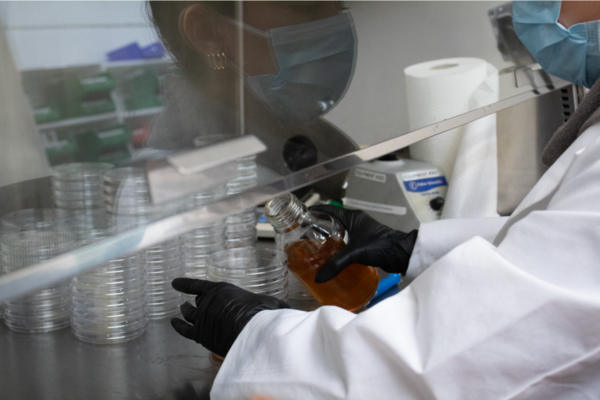503B sterile compounding pharmacies are ultimately responsible for their products, even when they outsource quality and sterility testing.
Here’s how to ensure your testing partner uses adequate laboratory controls so you can remain compliant and produce safe, high-quality products.
Who is Responsible for Ensuring Compounded Products are Sterile?
In FDA’s eyes, responsibility for quality and sterility of a pharmacy product lie with the brand owner or contract manufacturer. This is equally true for 503B sterile compounding pharmacies as they are subject to FDA current Good Manufacturing Practices (cGMPs). When analytical testing of these products is outsourced, it is important to ensure adequate laboratory controls are used.
Testing of bulk sterile compounding pharmacy components is regulated under Section 503B of the Food, Drug and Cosmetic (FD&C) Act and subject to diligent laboratory controls as part of FDA’s cGMPs under 21 CFR 211. These controls ensure a product is free from contamination of microorganisms by confirmation of test validity, verification and reproducibility of results without “testing to specification”.
Testing of 503B sterile compounded products confirms their identity, quality, purity, and sterility. One demonstration of appropriate laboratory controls is an ISO 17025 accreditation. Beyond that, asking questions before choosing an analytical testing laboratory or as part of an on-going satisfaction assessment will help assess whether a testing partner is a good fit.

1) Is Your Laboratory Testing Program Aligned With Product Specifications?
Testing drug components, in-process materials, and finished products must be conducted in a cleanroom and conform to laboratory controls that ensure the reliability of the tests performed and quality of the results. Standard Operating Procedures (SOPs) drive the development and execution of those process controls.
As a 503B sterile compounding facility, it is your responsibility to ensure your analytical laboratory uses appropriate sampling and testing methods, equipment, and procedures that are suitable for their intended use, and that are capable of accurately analyzing the specifications set forth for the product being tested. This is particularly true for sterility testing. If a validated or an established compendial test procedure is in the specification, those tests must be verified and documented to work under the conditions of actual use.
That means, for example, not using an HPLC method when GC is more appropriate, choosing appropriate media such as dilution rinses without antimicrobial or antibacterial properties, and running tests for their specified times.
When standard methods are not available, your analytical testing partner must be able to demonstrate appropriateness when developing methods and provide details of those methods so that you can verify and approve their use.
Ask your testing partner about their equipment, methods, and specifications. Are they appropriate for facilities that compound sterile products?
2) How Robust is the Lab’s Recordkeeping and Sample Retention?
In accordance with FDA’s cGMPs, laboratories must keep complete records – paper, digital, or a combination thereof – for a specified period of time. Recordkeeping is important, particularly for 503B sterile compounding facilities.
Per Good Documentation Practices (GDPs), records should capture in real time which procedures were followed, including date, time, and by whom, and whether any alterations to processes were made. If discrepancies required additional testing, those most be notated along with the final results.
When changes to any SOPs need to be made, those changes must be documented, including justification with a new control number assigned. These records must include established specifications and standards, including examinations and assays.
Records Must be Properly Stored
Records should be stored so they can be readily retrieved. The accessibility of testing records will be extremely important in the event of an adverse-event investigation or FDA inspection.
When processes, procedures, and results are not documented, in FDA’s eyes, they didn’t happen, making it impossible to effectively demonstrate cGMP compliance. With quality issues being high on FDA’s list of pharmaceutical observations, demonstration of cGMPs through records retention is important.
- Ask your analytical testing partner to provide their SOPs for recordkeeping and storage. Are they adequate?
- When FDA requests your records, are you confident that your contract laboratory will be able to produce them in short order?
- Do you need any additional or different accommodations?
3) Is Your Analytical Testing Laboratory Operating in Accordance With a Signed Quality Agreement?
Ultimately, the 503B sterile compounding facility’s Quality Unit is responsible for approving or rejecting drug products, regardless of where testing is performed. As tests confirm a product’s identity, safety, potency, purity, and quality, a Quality Agreement (QA) is recommended. However, because of the complexity of sterility, a Quality Agreement (QA) is a must when compounding sterile products.
Signed by both parties, a QA is a contract between the 503B sterile compounding manufacturer and the analytical testing laboratory indicating expectations for test execution at every step of the process. While a QA cannot exempt 503B compounders from statutory or regulatory responsibilities if applicable cGMPs are not performed by the laboratory, it does set expectations for how, when, and to what degree testing will be performed.
This QA is perhaps the most important document a 503B sterile compounding facility can develop with a service vendor. Without it, neither party can understand expectations with absolute certainty and at a granular level. This is particularly important when testing compounded sterile pharmaceutical products.
Choose the Right Lab for 503B Sterile Compounding
Choosing the right sterility testing laboratory is a critical business decision. Ask proactive questions and ensure you are comfortable with the level of detail in the answers. Certified Laboratories offers analytical testing for 503B sterile compounding facilities.
